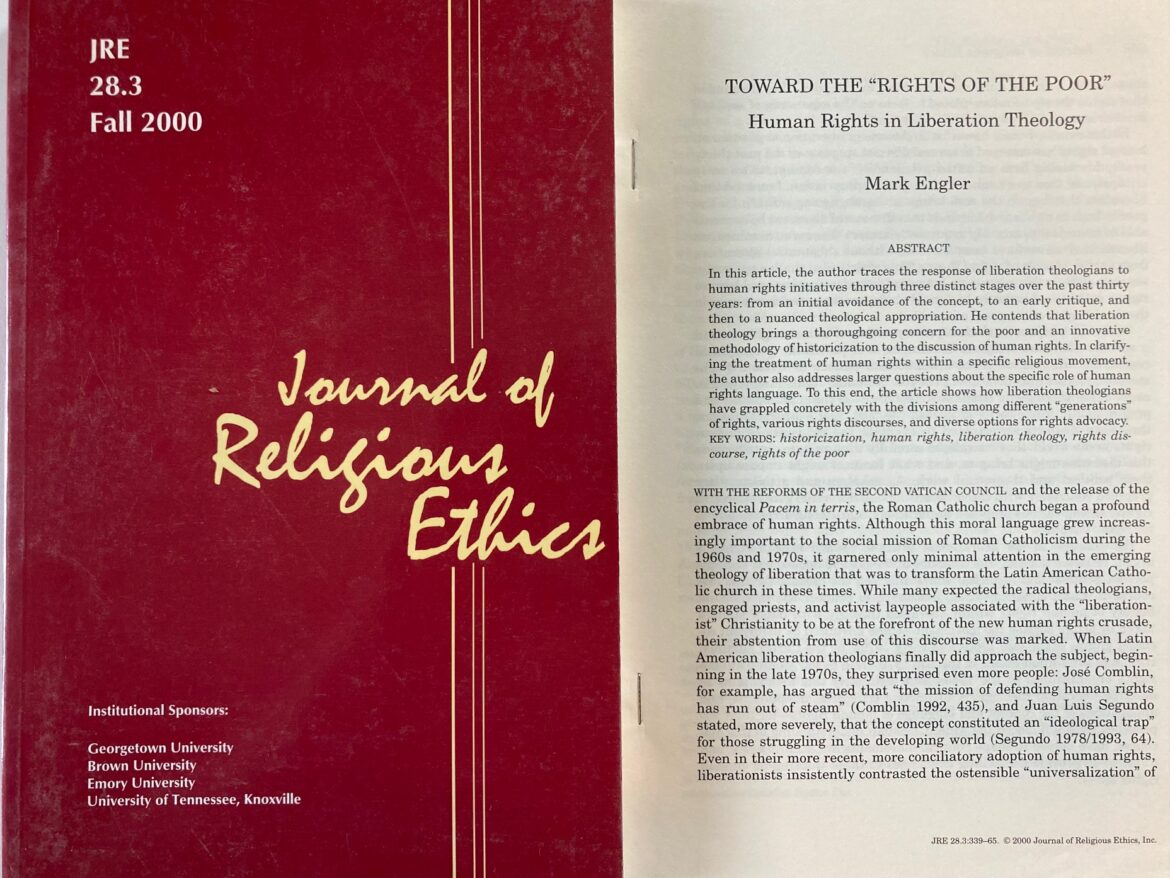An academic article on the evolving human rights discourse during the country’s civil war.
Presented to the symposium, “Human Rights: Changes and Challenges,” Georgia Institute of Technology, April 30, 1999.
Note: The full text of this article is available upon request to Mark Engler.
SUMMARY
For several years during the late 1980s, a visitor entering El Salvador by plane was immediately made aware that human rights were a charged issue in the country. Posters throughout El Salvador’s International Airport pictured a young girl with only one leg; the other, the government suggested, had been lost to a guerrilla land mine. “And her human rights?” The poster rhetorically asked, and with this question it aimed to debunk all those who had shortsightedly claimed that the Salvadoran military, in its stalwart defense against communist insurgency, had done anything less than champion the cause of human rights.
Before the end of the war in 1992 the government of El Salvador, making use of over a billion dollars in U.S. military aid, would murder more than 60,000 of its citizens. The sheer magnitude of the killing made it impossible to hide from international view, and El Salvador became a focus of the nascent human rights movement that had emerged in the 1970s. In the United States, President Reagan’s proclaimed resolve to defeat communism at any cost was denounced by large groups of “anti-imperialist” protesters. El Salvador also drew the attention of Christians throughout the world, who witnessed the Catholic Church in the country courageously stand in defense of the “rights of the poor.”
In this El Salvador of bloody dispute, one commonality united the many conflicting forces: each claimed to stand in defense of human rights. Of course, the nature of these rights was itself a matter of contention, so much so that this country became a crucial proving ground for various conceptions of human rights. In the face of an authoritarian disregard for human life various actors invoked liberal, Marxist, religious views of rights. This complexity alone justifies the use of El Salvador as a case study for examining how the contested theoretical terrain of human rights is mirrored in actual conflict.
As compelling, however, is the fact that the struggle for human rights in El Salvador has shifted but has not ended. For those who accepted the U.S. State Department move to equate human rights with procedural democracy, this small Latin American country finished its tenure as a human rights “problem” with U.N.-monitored elections in 1994. Likewise, for international monitoring groups whose work centers on drawing attention to the most heinous and sanguine of the world’s human rights crises, this country no longer merits much focus. But the situation appears very differently to those living in El Salvador, who are now struggling to combat overwhelming poverty, stark economic inequality, a corrupt judiciary, and an epidemic of gang violence. It is through considering their predicament that we can ask how the language of human rights can continue to be a relevant and influential force: How do we talk about human rights in “post-human-rights” El Salvador?
In “Liberation Theology and the Battle for Human Rights in El Salvador,” I undertake an analytical history of human rights in El Salvador. Through examining rhetorical statements, as well as considering accounts of the varied practical commitments made in the name of rights, I attempt to capture the changing content, tone, and spirit of Salvadoran human rights discourse in the past twenty years. My goal is to use this country’s experience to convey some of the larger complexities and tensions, potentials and problems in the use of this moral language. To this end I offer a periodization of human rights in El Salvador, distinguishing three distinct stages in the formation of rights discourse.
In the first period (1976-1982), tracing human rights discourse involves determining how the language of human rights came to crucially represent the most oppressed people of El Salvador; during this time an interesting alliance formed in defense of those endangered by the despotic and violent rule of elites. Secondly, examining the years between 1983 and 1989, I will explain how rights discourse became contentious and fragmented; human rights in this period increasingly was used in service of one of the different forces in armed conflict. Finally, looking at El Salvador in the nineties, I will explore the reconstruction of human rights as a force after the war; it is in this last period that religious thinkers, some heavily influenced by the critical insights of liberation theology, form some of their most challenging conceptions of how human rights can help reshape the political and economic systems that structure contemporary society.
Ultimately, I will argue that a liberal discourse formed in El Salvador, especially with the contributions of international monitoring groups and the U.S. State Department, and that this use of human rights had the net affect of effectively denouncing the Salvadoran government’s violation of civil and political rights. But a second rights discourse also developed; drawing strength from the vision of many martyred Salvadorans, this more socially- and economically-oriented language is especially important today, as the country reconstructs and transforms itself. In my conclusion, I will also consider how recent battles against neoliberalism have affected this emergent focus on second and third generation rights, again evidencing the politicized nature of different rights claims.
